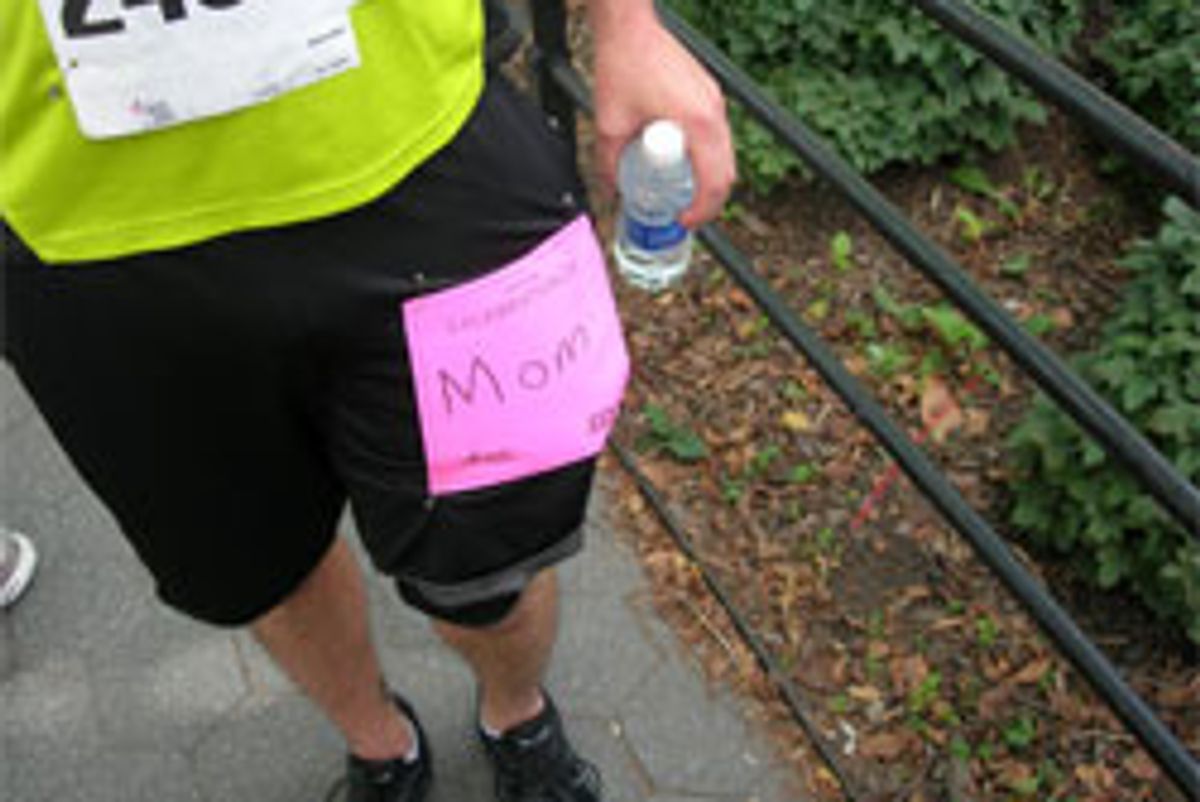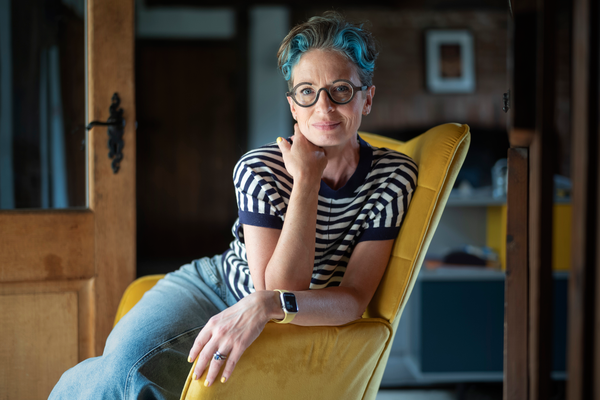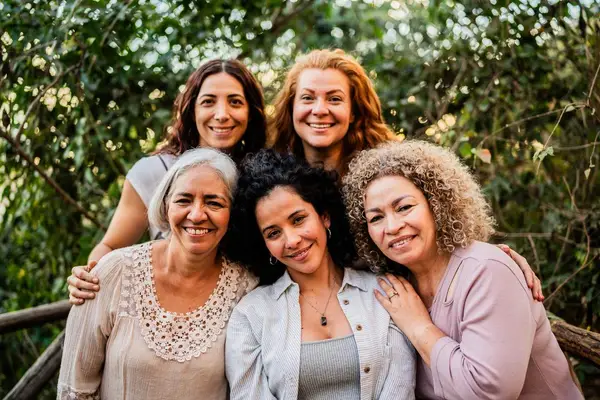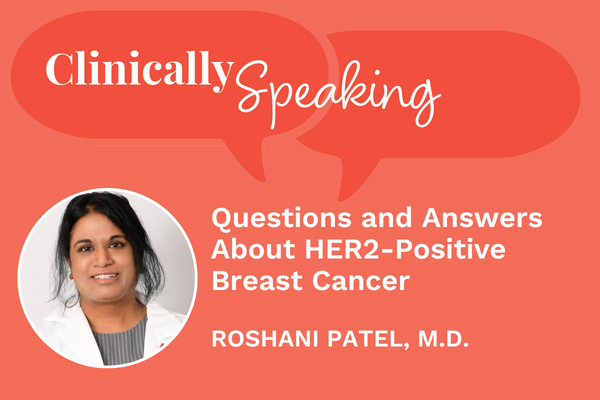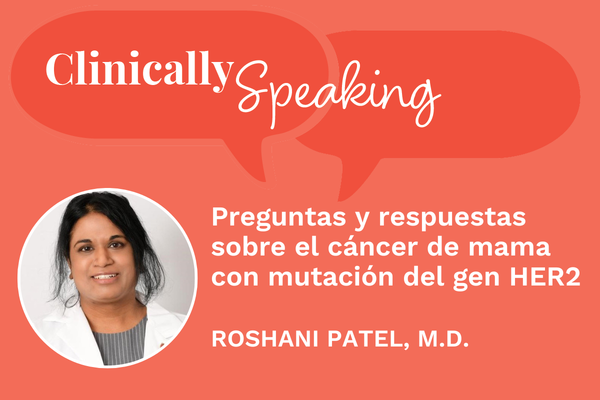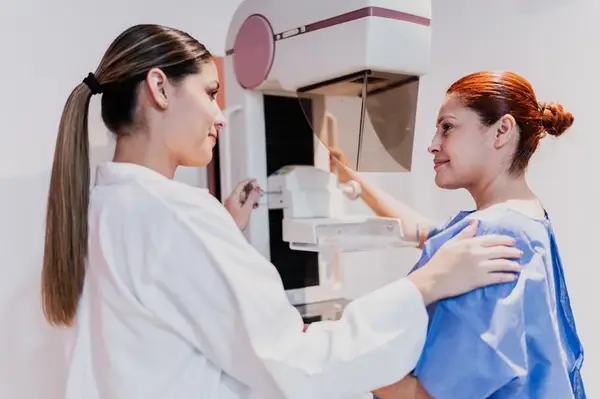Pink is swirling all around this month. You can't help but notice that. And I'd be burying my head in the sand if I didn't acknowledge that it is, after all, breast cancer awareness month. This photo was taken a few weeks ago when my 25-year-old son, Jonathan, ran in the Race for the Cure in Central Park. When I spotted him coming around the bend, I unexpectedly burst into uncontrollable tears!
But really, every month is about breast cancer; it's never far from my consciousness. I'm reminded of how the disease touched me when I get dressed every morning. I'm reminded how the disease steals lives when, each January and October, I would have been toasting to another year growing old together with my two closest friends who are no longer in this world because they were part of the cruel statistics. I'm reminded that, despite lots of advances in medical screening, diagnosis and treatment, 12.15% of women born today will be diagnosed with breast cancer at some time during their lifetime.
There is increased awareness and increased knowledge for sure. But with that, confusion and misinformation still circulate around the issue. Here are some common misconceptions:
- Breast pain is a symptom of breast cancer. That's rarely the case; breast cancer, especially early breast cancer, usually does not cause pain and may exhibit no noticeable symptoms. Most aches, pains or tenderness can be attributed to things like fibrocystic breast changes and the rise and fall of hormones, or a benign fluid-filled sac (a cyst), which can feel firm or squishy and can be aspirated by a doctor to withdraw the fluid causing the pain.
- You're only at risk if breast cancer runs in your family. Only 5 to 10 percent of all breast cancers are hereditary due to mutations in genes associated with the disease. These mutations are more common among certain geographic or ethnic groups, like people of Ashkenazi (central or eastern European) Jewish descent and people of Norwegian, Icelandic or Dutch ancestry. Because they have a shared ancestry over many generations, particular genetic changes can occur more frequently in these groups.
- Monthly self-exams don't make a difference. Despite recent advice discounting the importance of regular breast checks, many experts still believe in them. Mammography, clinical exams, MRIs: they're reliable screening methods, yet none of them is perfect, so it's wise to increase your chance of early detection by becoming familiar with your own breasts and reporting any changes, like lumps, swelling, dimpling or discharge to your doctor.
- Tight, underwire bras cause breast cancer. This myth started with a husband and wife medical anthropologist team claiming that by wearing tight-fitting bras all day, every day, women inhibited lymphatic drainage, thus causing toxins to become trapped in breast tissue. But scientists discounted this theory in its failure to exclude confounding variables such as the presence in some women of known risk factors for breast cancer such as family history, hormones, age, weight, exercise levels, giving birth over the age of 30 or not having had children.
- Only women get breast cancer. Although women do account for the vast majority of breast cancers, men are susceptible, too. With men, their cancers are usually linked to a strong family history or genetic causes and are usually seen in later stages, since men are not typically screened for breast cancer.
- Older women don't need to get mammograms. Since the incidence of breast cancer increases with age, older women should get mammograms indefinitely. The highest incidence of the disease is in women in their 70s. The risk is approximately 1 in 23 for a woman in her 30s; rising to 1 in 8 by the time she is 85.
- Wearing antiperspirant causes breast cancer. Parabens, which are used as preservatives in some antiperspirants, do have weak estrogen-like properties. One small study found parabens in samples of tissue from human breast tumors but failed to analyze healthy breast tissue or tissues from other areas of the body (thus failing to demonstrate that parabens are found only in cancerous breast tissue). Subsequent studies have been unable to make a definite connection between parabens and breast cancer. The American Cancer Society says that more research is needed to study this issue.
- A lump is the only sign of breast cancer. While a lump may indicate breast cancer or other benign breast conditions, there are other changes that could indicate cancer, like skin irritation or dimpling; swelling, nipple retraction or discharge (other than breast milk); redness, scaliness, or thickening of the nipple or breast skin. Lymph nodes under the arm might swell if the cancer has already spread before a tumor in the breast is even large enough to be felt. And a mammogram can pick up a cancer before any symptom is felt or seen at all.
- Only your mother's family history of breast cancer is important. Your father's family history is just as important, especially the women on his side of the family. And other cancers in men, like early-onset prostate or colon cancers should be considered when assessing your risk, too.
- Women with lumpy, fibrocystic breasts are more at risk. Once thought a factor in increasing your risk, it is no longer seen as a connection. Lumpy breasts do, however, make it more difficult to differentiate normal tissue from cancerous tissue, so ask your doctor if you might be helped further by adding an ultrasound to your mammogram screenings.
Want to learn more?
Breast Cancer
How to Help a Friend with Cancer
Your Guide to Breast Health

